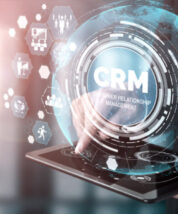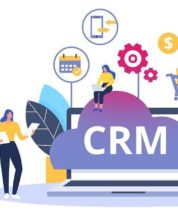Overview
By combining the power of intelligent CRMs with the predictive capabilities of artificial intelligence in marketing, brands move from a static model of customer management to a dynamic, proactive, and personalized relationship strategy.
Why is this shift so critical today?
Because:
- Traditional CRMs are hitting their limits in the face of increasingly complex customer journeys,
- AI Marketing Automation enables faster, smarter actions,
- Predictive CRM Marketing transforms data into a real growth engine,
- And now more than ever, relevance and real-time responsiveness are what separate loyalty from churn.
In this article, we’ll explore how and why CRM-AI integration is redefining the future of relationship marketing – and how you can prepare your organization to capitalize on this strategic evolution.
Traditional CRMs are reaching their limits
For years, traditional CRMs have been essential tools for businesses. They helped centralize customer data, track interactions, optimize commercial processes, and manage portfolios more effectively.
But in 2025, it’s clear that these traditional systems are reaching their limits.
Why? Because:
- Traditional CRM platforms remain reactive: they record what has already happened but don’t anticipate what could happen next.
Example: your CRM knows that a customer purchased a product in February - but it can’t predict what they might need tomorrow.
- They heavily depend on manual intervention: segmentation, lead scoring, campaign creation... all still often require significant human effort.
- They fail to capture real-time signals from customer behavior: browsing activity, time spent on a product page, abandoned carts - data that could inform better marketing actions but often remains underused or delayed.
The result?
In today’s fast-paced, hyper-connected world, traditional CRMs risk becoming a bottleneck rather than an asset.
This is precisely where CRM-AI integration comes into play. By introducing artificial intelligence into CRM marketing, businesses can shift from static data management to dynamic, predictive customer engagement. With AI and CRM working together, brands move from simple record-keeping to intelligent action:
- Predicting customer needs,
- Personalizing communications,
- And triggering the right actions at the right moment.
Our Expert’s Take:
« Traditional CRMs have played a vital role in the evolution of relationship marketing. But today, it’s not enough to manage what already exists - you need to anticipate what’s coming. Through CRM-AI integration, brands shift from static customer management to dynamic, real-time relationship marketing, perfectly aligned with modern consumer expectations. »
How AI turns your CRM into a personalization engine
For a long time, personalization in CRM meant inserting a customer’s first name into an email or sending a birthday offer. But today’s consumers expect far more:
- Contextual relevance,
- Real-time responsiveness,
- And experiences that anticipate their needs—not react to them.
This is where AI and CRM integration completely changes the game. With artificial intelligence and CRM marketing working hand-in-hand, your system doesn't just record behavior - it interprets it and acts on it instantly.
What an Intelligent CRM powered by AI can do:
- Analyze subtle behavior signals like browsing patterns, dwell time, cart abandonment, and purchase intent,
- Detect micro-intentions: a customer spending 10 minutes on a product page needs a different follow-up than someone casually browsing,
- Adapt content dynamically based on real-time behavior across channels (website, app, emails).
Concrete example:
A customer repeatedly visits a product category but hasn’t made a purchase. An intelligent CRM integrated with AI can automatically:
- Send a targeted product email,
- Offer a personalized discount,
- Or trigger a chatbot to proactively assist them on their next visit.
This is AI Personalized Marketing in action: Every interaction evolves with the customer, without overwhelming your teams with manual adjustments.
à Curious to explore the broader impact of AI across the digital marketing landscape? Check out our article on how artificial intelligence is reshaping digital marketing.
Our Expert’s take:
« Integrating AI into CRM isn’t just about making processes smarter - it’s about creating deeply contextual, predictive, and emotionally intelligent customer experiences. Brands that master this shift move beyond personalization - they build real, sustainable loyalty. »
Subscribe to our newsletter and gain access to strategic insights, exclusive analyses, and expert tips to enhance your online presence.
Automation, Personalization, Prediction: the 3 Pillars of the New-Generation CRM
In today’s environment - where customer attention is fleeting, and competition is fierce - a basic CRM is no longer enough. The new-generation CRM, powered by AI, becomes a true nerve center for your marketing strategy.
At the heart of this transformation are 3 pillars:
AI Marketing Automation: Acting at the right Moment, Automatically
With AI Marketing Automation, your CRM can trigger personalized actions based on:
- Live browsing behavior,
- Customer lifecycle stage (new lead, loyal customer, dormant account),
- Or predictive scoring models (likelihood to buy, risk of churn).
Example:
A customer is about to abandon their cart? An automated CRM can send a real-time push notification or a targeted email within minutes, offering an incentive to complete the purchase.
This kind of real-time responsiveness is simply unmanageable manually—but fully achievable with AI.
AI Personalized Marketing: Crafting unique journeys for every customer
With a traditional CRM, segmentation remains broad: demographics, location, purchase history. With CRM-AI integration, you move to individualized engagement:
- Dynamic content based on customer behavior,
- Personalized product recommendations,
- Optimal timing for communication based on previous interactions.
Example:
Two customers viewing the same product page may receive two entirely different follow-ups, based on their browsing habits, purchase history, and engagement patterns. This is true AI Personalized Marketing - creating relevance without human micromanagement.
Predictive CRM Marketing: Shifting from Reaction to Anticipation
Predictive CRM Marketing enables you to see beyond the immediate:
- Identifying leads with the highest conversion potential,
- Predicting which customers are at risk of churn,
- Optimizing campaign investments by focusing on truly strategic audiences.
Example:
Your CRM predicts that 15% of your top-tier customers are at risk of churn over the next month? You can launch a re-engagement campaign before they even disengage.
✦ For more insight into how AI is transforming buying behavior and consumer expectations, explore our article on AI and evolving shopping trends.
Our Expert’s Take:
« A next-generation CRM isn’t just a storage system - it’s a real-time strategic engine. With the right blend of automation, AI-driven personalization, and predictive insights, brands move from managing customer data to orchestrating intelligent customer experiences. »
Practical Use Cases of CRM-AI Integration
CRM-AI integration isn’t just a concept for tech giants anymore. It’s a practical, accessible reality for any brand looking to better understand, engage, and retain its customers.
Let’s dive into some real-world examples of how AI and CRM work together to drive smarter relationship marketing.
Predicting Customer Churn
With Predictive CRM Marketing, you no longer need to wait for customers to leave - you can spot the warning signs early.
How?
- Decreasing purchase frequency,
- Drop in engagement with communications,
- Lower website or app activity.
Concrete example: Your intelligent CRM identifies that 10% of your VIP customers show signs of disengagement. Instead of reacting later, you can automatically launch:
- Personalized re-engagement offers,
- Targeted loyalty perks,
- Or a personal outreach call from the customer service team.
Smart Automation of Sales Follow-Ups
With AI Marketing Automation, follow-up actions are triggered precisely when they matter:
- Based on browsing history,
- Engagement scores,
- Or behavioral patterns.
Concrete example: A prospect opens two product-related emails, browses a product page, but doesn’t purchase? Your CRM can automatically:
- Send a personalized reminder,
- Offer a limited-time discount,
- Or assign the lead to a sales rep for immediate follow-up.
Hyper-Personalized Product Recommendations
Combining CRM data with AI-powered engines, you can:
- Suggest complementary products based on purchase history,
- Cross-sell based on patterns seen in similar customer profiles,
- Dynamically adjust bundles or offers in real time.
Concrete example:
A customer buys a DSLR camera.
Without manual input, your automated CRM can recommend:
- Compatible lenses,
- Camera bags tailored to their model,
- And even extended warranty plans based on their profile.
✦ Want to dive deeper into the next evolution of CRMs? Read our full piece on cognitive CRMs and AI-powered customer engagement.
Our Expert’s Take:
« With CRM-AI integration, brands can engage customers at the right moment, with the right message, through the right channel - without overwhelming marketing teams. These real-world use cases show how AI transforms customer relationships into dynamic, value-generating interactions. »
Common Pitfalls to avoid when integrating AI into CRM
CRM-AI integration opens up incredible opportunities - but it’s not without risks. If poorly prepared or poorly executed, it can lead to frustration, inefficiency, or even a breakdown of trust with your teams and your customers.
Here are the most common mistakes we see - and how you can avoid them.
1. Jumping in without solid Data Foundations
AI is only as good as the data it learns from. If your CRM data is incomplete, outdated, or poorly structured, your AI will generate poor predictions and irrelevant automations.
Our advice: Before thinking about AI, audit and clean your CRM data.
A smaller but reliable dataset will always outperform a vast but messy database.
2. Over-segmenting to the point of Paralysis
Thanks to AI Marketing Automation, the temptation is strong to create hyper-targeted micro-segments. But over-segmentation can:
- Fragment your campaigns,
- Overcomplicate processes,
- And undermine the consistency of your customer experience.
Our advice: Personalization must always serve the customer experience—not drown it in complexity.
3. Forgetting the human Element
Yes, AI and CRM can automate a lot. But without human oversight, AI can:
- Make absurd recommendations,
- Reinforce bias or stereotypes,
- Or execute poorly aligned campaigns.
Our advice: Even with an Automated CRM, keep your marketing and sales teams actively involved: Validating algorithms, adjusting scoring models, and ensuring the ethics and relevance of your automations.
4. Believing Technology alone Is Enough
Implementing an Intelligent CRM is a fantastic enabler—but it won’t magically fix strategic misalignment. Successful CRM-AI integration also requires:
- A clear vision of the customer journey,
- A strong collaboration between marketing, sales, and data teams,
- And a deep understanding of your brand’s relationship model.
Technology is the tool. Strategy is the driver.
Our Expert’s Take:
« CRM-AI integration is a phenomenal accelerator—but it doesn't replace strategic thinking, clean data governance, or human intuition. The brands that succeed are the ones that find the right balance between machine intelligence and human expertise. »
How to prepare your Business for CRM-AI Integration
Integrating AI into your CRM isn’t just a technical upgrade - it’s a strategic shift that touches your tools, your processes, and your company culture. To succeed, preparation is everything.
Here’s how to lay a solid foundation for a smooth and impactful CRM-AI integration.
1. Clean and structure your Data First
Before thinking about algorithms or personalization journeys, focus on data hygiene:
- Validate the freshness and accuracy of your customer data,
- Standardize formats and fields,
- Eliminate duplicates and correct inconsistencies,
- Set up a process for continuous data maintenance.
Without clean data, even the smartest AI will fail.
2. Build a Data-driven Culture
CRM-AI integration isn’t just about technology - it’s about how your teams think and operate. Our advice:
- Educate teams about the opportunities and risks of AI and CRM,
- Train marketers, salespeople, and customer service reps to leverage data in their daily work,
- Encourage a mindset of continuous learning and experimentation.
AI is a powerful ally, but it thrives best alongside human curiosity and critical thinking
3. Choose the right Tools and Partners
Not all CRMs are created equal when it comes to AI readiness. Look for:
- An Automated CRM that integrates easily with AI modules,
- Flexible platforms with strong APIs and open architectures,
- Partners who understand both technology and relationship marketing - not just one or the other.
The goal is not just to adopt tools, but to build an ecosystem that evolves with your needs.
4. Start small, then scale
You don't need to launch a massive AI transformation from day one. Start with a few high impact use cases:
- Churn prediction,
- Product recommendation,
- Post-purchase journey automation.
Prove value quickly - and use those early wins to expand your CRM-AI strategy organically across your marketing ecosystem.
Our Expert’s Take:
« Implementing CRM-AI integration isn’t about chasing buzzwords. It’s about preparing your business to understand your customers better, anticipate their needs faster, and activate your data smarter. Success belongs to the brands that combine vision, operational rigor, and human creativity. »
Subscribe to our newsletter and gain access to strategic insights, exclusive analyses, and expert tips to enhance your online presence.
Conclusion
In 2025, relationship marketing is no longer just about managing data or sending timely messages. It’s about mastering the ability to anticipate, personalize, and act intelligently - all while maintaining trust and authenticity.
This is exactly where CRM-AI integration becomes transformative. By combining intelligent CRMs with artificial intelligence, brands move beyond reactive marketing to create proactive, predictive, and highly personalized customer experiences.
The future belongs to those who:
- Activate their data smartly,
- Personalize meaningfully at scale,
- Predict behaviors before they happen,
- And build lasting, genuine relationships with their customers.
With AI Marketing Automation, AI Personalized Marketing, and Predictive CRM Marketing, brands now have the tools to turn customer relationships into sustainable growth engines - while keeping human connection at the core.
At Eminence, we believe this isn’t just another digital trend. It’s a profound shift in how brands engage, retain, and empower their audiences. And we’re here to help you build your roadmap - with strategy, technology, and impact.
Ready to elevate your relationship marketing with CRM-AI integration?








